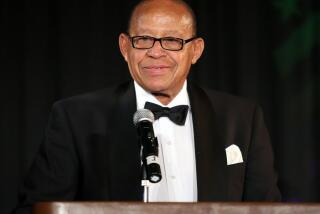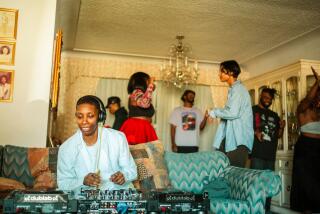Celebrities Use Airwaves to Take On Street Violence
“The things I do make me a star,
You can be too if you know who you are.
Just put your mind to it, you’ll go real far
Like the pedal to the metal when you’re driving a car.”
--Run-D.M.C.
A Hawthorne teen-ager, her voice edged with lingering bitterness, called to protest the senselessness of her brother’s recent death during gang violence. Another young woman from East Los Angeles shocked listeners with her tale of a neighbor who sends her 10-year-old daughter out to sell drugs.
A grim portrait of Los Angeles-area neighborhoods gripped by gang violence, drug sales, staggering youth-unemployment and disintegrating families emerged Thursday from callers who swamped telephone lines at radio station KDAY to express their frustration, fear, anger, helplessness . . . and their hopes that the first tentative steps could be taken to turn the situation around.
The station provided two hours of air time for the “rap” music trio Run-D.M.C., singer Barry White, Olympic boxing gold medalist Paul Gonzalez and Community Youth Gang Services regional director Leon Watkins to call for “A Day of Peace” among warring gangs. A successful day of peace, Watkins said, could lead to a season of peace in November and December.
“It doesn’t matter if anybody wants to hear what I’ve got to say, I feel good if I know I’ve helped some kids,” the rap group’s Joseph (Run) Simmons said after the broadcast. “I think I helped a lot today because kids love us that much.”
KDAY General Manager Ed Kerby said the broadcast was an outgrowth of gang violence that left more that 40 people injured at an August concert in Long Beach where Run-D.M.C. was scheduled to appear. After the Long Beach incident, Los Angeles Street Scene officials would not allow the group to perform.
“I’ll be damned if we’ll have them,” Deputy Mayor Tom Houston said.
Watkins said he is not “so naive as to believe this (broadcast) will stop the violence. But some will listen. There has to be a starting point in stopping these drive-by shootings . . . this violence.”
Through August, gang violence in Los Angeles increased 22.6% over the same period last year, with a 32% increase in homicides, said Cmdr. Larry Kramer, LAPD’s gang enforcement coordinator. He added, however, that preliminary figures show a “downward trend” in homicide and other gang crime last month.
The broadcast had an immediate impact at the Community Youth Gang Services offices, which fielded at least 500 calls on its gang hot line and office telephone during the program.
“We’ve got calls from gang members wanting to know how to get out; we’ve gotten requests for information on drugs,” staffer Natalie Salazar said.
Urging young people to stay away from drugs, “We Are The World” producer Quincy Jones called in to advise: “If you want respect from other people, you have to respect yourself.”
Four recent gang dropouts who only agreed to be identified by their first names listened attentively to the broadcast at a gang services office on Slauson Avenue.
“They might be talking about changing things, but they aren’t coming down here to see what our environment is,” said Eric, 23. But he and the others agreed that the broadcast was worthwhile, needed.
“Young people listen to Run-D.M.C. more than they would listen to their parents or the police,” said Ron, also 23.
“You don’t accomplish anything by gang banging (fighting),” said Ronell, 20, with the weariness of a veteran who has seen too many street wars. “If you gang bang, you have only two choices: jail or death.”
More to Read
Sign up for Essential California
The most important California stories and recommendations in your inbox every morning.
You may occasionally receive promotional content from the Los Angeles Times.










